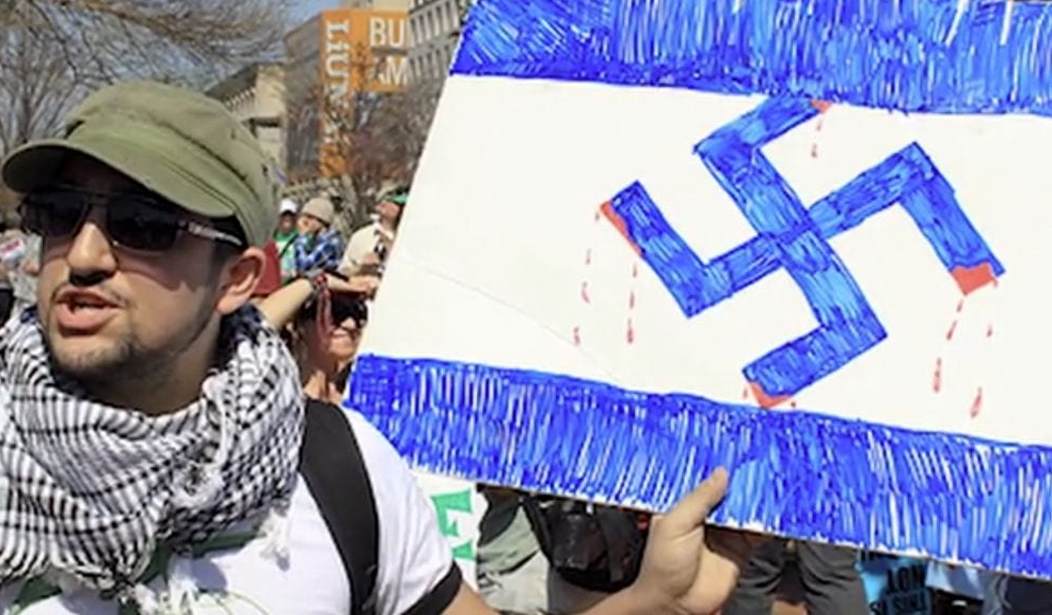A concerned group of pro-Israel activists crowded into the social hall of Beth El Synagogue in East Windsor, New Jersey, Thursday night. The evening’s topic was learning how to prepare college students in their families to combat the boycott/divestment/sanctions (BDS) movement growing on college campuses across the country.
BDS presents itself as a peaceful protest against Israeli settlements in the West Bank through economic sanctions on products produced in what Palestinian activists call “the occupied territories.” It isn’t. The co-founder of the BDS movement, Columbia University Professor Omar Barghouti, has spoken openly about eliminating the entire State of Israel from the map.
Natan Sharansky, executive chairman of the Jewish Agency and human rights activist, has tagged the BDS movement as both anti-Israel and anti-Semitic for its use of what he calls the “three Ds”: delegitimization, demonization, and double standards.
In a program co-sponsored by the Beth El Israel Affairs Committee and the Princeton chapter of Hadassah, the Women’s Zionist Organization of America, participants viewed two short films produced by non-profit Israel advocacy group Jerusalem U: Crossing the Line 2: The New Face of Anti-Semitism on Campus, and The Plight of the Palestinian Refugees.
Guests were then invited to query and comment during a student panel discussion led by Hillel Zaremba, the director of community relations & new media at Consulate General of Israel in Philadelphia.
Crossing the Line 2 details the experiences of a number of pro-Israel student activists on campuses including NYU and Brigham Young University, where the rise of the BDS movement resulted in violent protests, walkouts, and various forms of student harassment. Two Ohio University students, Rebecca Sebo and Gabriel Sirkin, feature prominently in the film. Their role as pro-Israel advocates on campus landed them in jail thanks to a pro-BDS student body president.
Refugees provides a concise account of the Palestinians who have claimed refugee status since 1948. The film highlights several facts that many audience members admitted not knowing. One shocking revelation, for instance: the United Nations Relief and Works Agency (UNRWA), established specifically for Palestinian refugees, has granted refugee status to the descendants of those who left Israel in 1948. In other words, as the film explains, the grandchildren of a Palestinian who fled Jerusalem in 1948 are eligible to claim refugee status — despite having obtained citizenship in another country, such as the United States.
Hence, the Palestinian refugee population continues to grow. Every other refugee population around the globe? Logically, all are in steady decline.
Both films are factual and concise. They should be strongly recommended viewing for all high school and college students with an interest in the Israeli/Palestinian conflict, whether they are Jewish or not. As Zaremba was quick to note in the discussion following Crossing the Line, “intersectionality” isn’t just for Students for Justice in Palestine and Black Lives Matter. Forging relationships over common ground is something Jewish campus organizations must do in order to fight back against BDS.
One such organization, Zaremba noted, is The David Project. The David Project exists to combat the fear felt by many Jewish students on campuses where virulent BDS protests thrive.
The group works to train student advocates to reach out to non-Jewish groups on campus with a pro-Israel message. “Getting to know each other as people,” Zaremba explained, helps not only to forge alliances but to alleviate the “burden of being alone” in supporting Israel.
Standing up to the BDS movement isn’t the sole responsibility of college students. Mark Merkovitz, interim director of the Jewish Federation of Princeton/Mercer/Bucks, noted that it is also the responsibility of parents to prepare their children to build pro-Israel coalitions on campus. The Federation is also playing an active role in combating BDS on campus through the Israel Action Network (IAN).
The college students present agreed that, despite their strong Jewish educations, they were woefully unprepared for what they faced when encountering pro-Palestinian and BDS activists on campus.
Not only do they lack the basic facts on the conflict, they are completely unaware of the Palestinian narrative. Columbia sophomore Ben Chevlin credits his experience at the university for making him an “educated advocate for Israel” thanks to encountering and even befriending those with whom he disagrees.
Organizations like Jerusalem U play a vital role when it comes to combating BDS on campus. Rutgers University Hillel President Samantha Brandspiegel was quick to note that “students don’t really care” about the Israel/Palestine conflict unless they’re directly involved. She explained that this apathy renders students highly susceptible to the propaganda spewed by the BDS crowd.
While Hillel leadership is consumed with building and sustaining membership through positive cultural programming, Jerusalem U provides the training necessary for students to become proactive supporters of Israel on campus.
Image credit: Times of Israel/Jerusalem U.









Join the conversation as a VIP Member